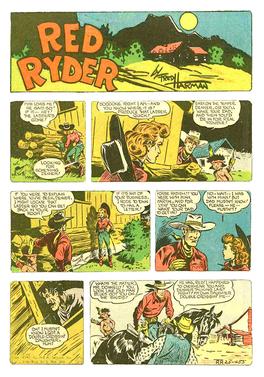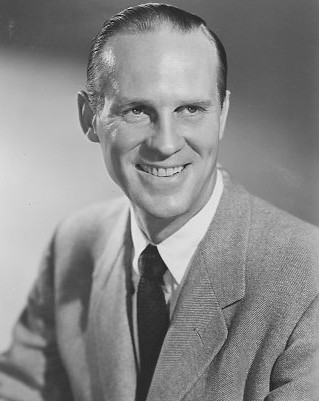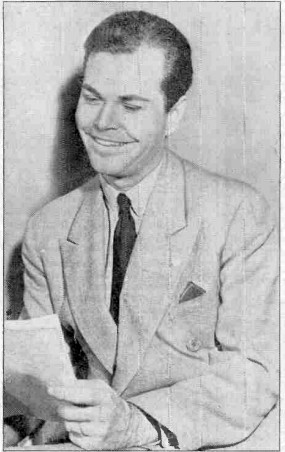
The Mutual Broadcasting System was an American commercial radio network in operation from 1934 to 1999. In the golden age of U.S. radio drama, Mutual was best known as the original network home of The Lone Ranger and The Adventures of Superman and as the long-time radio residence of The Shadow. For many years, it was a national broadcaster for Major League Baseball, the National Football League, and Notre Dame Fighting Irish football. From the 1930s until the network's dissolution in 1999, Mutual ran a respected news service along with a variety of lauded news and commentary programs. In the 1970s, Mutual pioneered the nationwide late night call-in talk radio program, introducing the country to Larry King and later, Jim Bohannon.

Red Ryder is a Western comic strip created by Stephen Slesinger and artist Fred Harman which served as the basis for a wide array of character merchandising. Syndicated by Newspaper Enterprise Association, the strip ran from Sunday, November 6, 1938, through 1965.
The Six Shooter is a United States Western old-time radio program starring James Stewart as a gunfighter. It was created by Frank Burt, who also wrote many of the episodes, and lasted only one season of 39 episodes on NBC. Initially, it was broadcast on Sundays at 9:30 pm Eastern Time, through October 11. Then it was heard at 8:30 pm for three weeks. Finally, on November 8, 1953, through March 21, 1954, it was broadcast Sundays at 8 pm; beginning April 1, 1954, through the final episode, it was on Thursdays at 8:30 pm. One old-time radio directory called the program "a last, desperate effort by a radio network (NBC) to maintain interest in adventure drama by employing a major Hollywood movie star in the leading role."

Charles Drake was an American actor.

William Donald MacLaughlin was an American actor. The son of a doctor, MacLaughlin was born November 24, 1906, in Webster, Iowa. He studied speech and English at Iowa Wesleyan University, Northwestern University, and the University of Arizona.

Reed Hadley was an American film, television and radio actor.

Howard St. John was a Chicago-born character actor who specialized in unsympathetic roles. His work spanned Broadway, film and television. Among his best-remembered roles are the bombastic General Bullmoose in the stage and screen versions of the 1956 musical Li'l Abner, and his supporting roles in the classic comedies Born Yesterday (1950) and One, Two, Three (1961).
The year 1938 saw a number of significant events in radio broadcasting.

Francis Michael Dunne was an American actor, radio personality and disc jockey. He was active in television and films from 1945 to 1973, and was also credited as Steve Dunn, Michael Dunne, Stephan Dunne, and Steve Dunne.

Gene Autry's Melody Ranch is a Western variety radio show in the United States. A 15-minute pilot show aired on December 31, 1939. The program ran from January 7, 1940 to August 1, 1943, and from September 23, 1945 to May 16, 1956. The show's entire run was broadcast over the CBS radio network, sponsored by Doublemint gum. The approximately two-year interruption resulted from Autry's enlistment in the United States Army to serve in World War II. Initially titled Doublemint's Melody Ranch, the show's name was changed to Gene Autry's Melody Ranch in early 1941. Episodes were 30 minutes long except for a 15-minute version that ran from September 23, 1945 to June 16, 1946. The theme song was "Back in the Saddle Again".
Hollywood Star Playhouse is a radio dramatic anthology series in the United States. It was broadcast April 24, 1950-February 15, 1953, appearing on CBS, ABC and NBC over that span.
Mayor of the Town is a syndicated American sitcom that aired in 1954.
Hopalong Cassidy is a radio western in the United States, featuring the character Hopalong Cassidy created by writer Clarence E. Mulford. It was syndicated via electrical transcription, beginning in 1948 and continuing into 1950. Its network broadcasts began on Mutual January 1, 1950, and ended on CBS December 27, 1952.
For a broader look at the character on which this program was based, see Bulldog Drummond.
Valiant Lady is an American radio soap opera that was broadcast on ABC, CBS, and NBC at various times from March 7, 1938, through August 23, 1946, and later between October 8, 1951, and February 19, 1952.
Red Ryder was an American radio western series based on the popularity of the comic strip Red Ryder by Stephen Slesinger and Fred Harman. It debuted on February 3, 1942 on the NBC Blue Network and was broadcast three days a week, on Tuesdays, Thursdays and Saturdays. After the sixth episode Langendorf Bread became its prime sponsor. The final episode was broadcast in 1951.
Tarzan is a generic title that can be applied to any of three radio jungle adventure programs in the United States. Two were broadcast in the 1930s and one in the 1950s.

Counterspy Meets Scotland Yard is a 1950 American film noir B movie directed by Seymour Friedman and starring Howard St. John, Ron Randell and Amanda Blake.

David Harding, Counterspy is a 1950 American film noir crime film directed by Ray Nazarro and starring Willard Parker. It was based on the radio series Counterspy.

Howie Wing is an American old-time radio juvenile aviation adventure serial. It was syndicated by the World Broadcasting System and distributed initially to stations in Canada, beginning on January 31, 1938. The Don Lee Network began carrying it in the western United States on February 12, 1938. The program was broadcast weekdays on CBS from October 3, 1938, until June 30, 1939.










